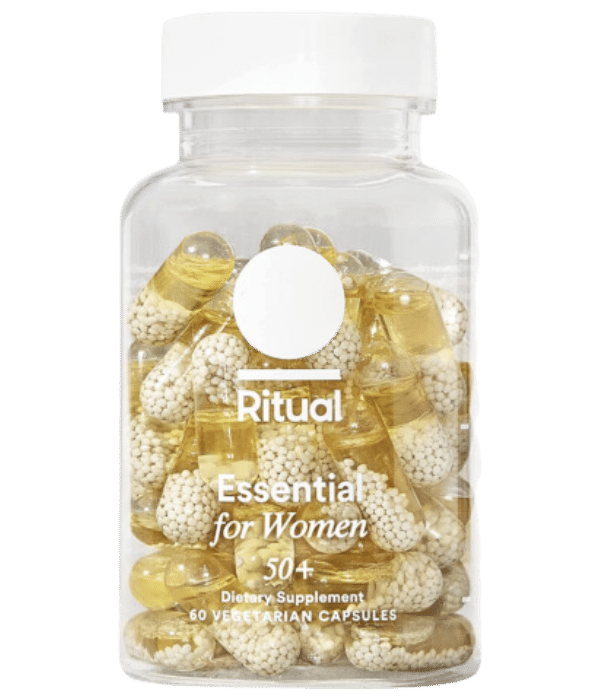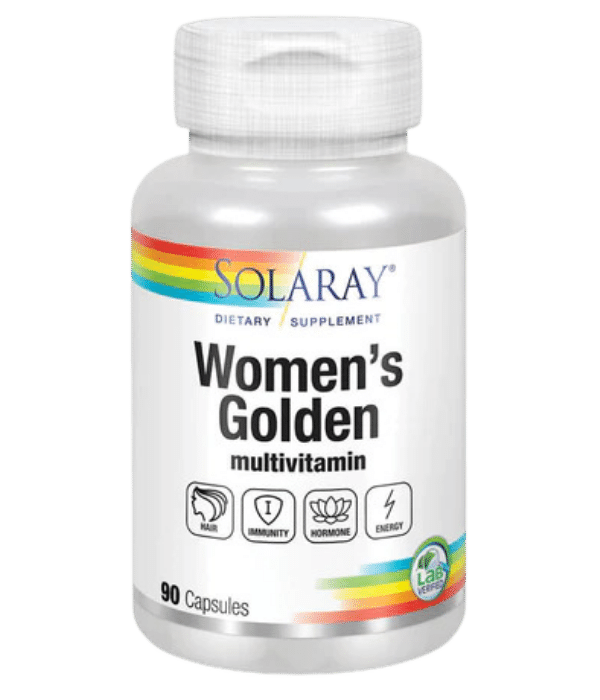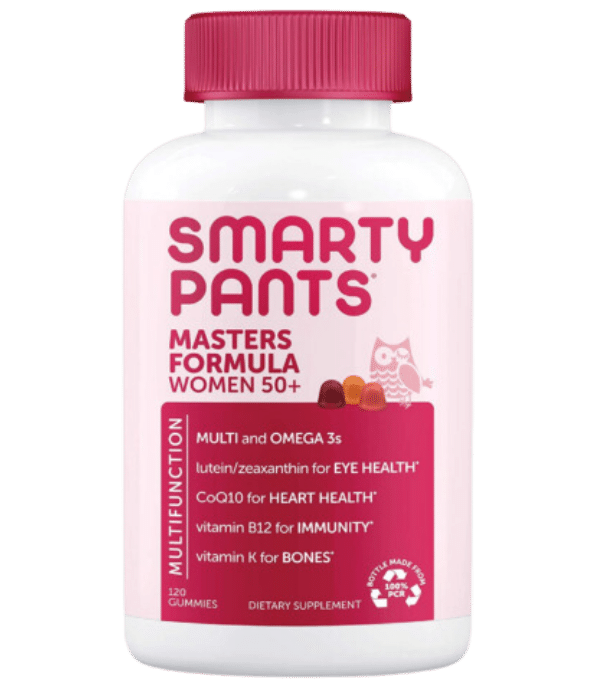Talk to a Registered Dietitian and use INSIDER20 for 20% off!
Talk to a real Dietitian for only $99: Schedule Now
This post contains links through which we may earn a small commission should you make a purchase from a brand. This in no way affects our ability to objectively critique the products and brands we review.
Evidence Based Research To fulfill our commitment to bringing our audience accurate and insightful content, our expert writers and medical reviewers rely on carefully curated research.
Read Our Editorial Policy
As a woman’s vitamin and mineral needs change throughout her lifetime, it’s important to take supplements designed for that specific life stage.
In addition to having slightly different nutrient needs, post-menopausal women may be looking for additional compounds to support digestive, immune, cognitive, hormonal, or cardiovascular health.
While it’s possible to meet the majority of one’s nutrient needs from diet alone, many 50+ women prefer the nutritional insurance that comes with taking a multivitamin.
In this article, check out our top seven multivitamin supplement choices for women over 50, including our number one pick—Ritual Essential for Women Multivitamin 50+—plus options for women who are on a budget, want to take gummies, or need extra support for vision, heart health, and digestion.
Best Overall | Best Value | Best Gummy | |
|---|---|---|---|
| Product | Ritual | Solaray | SmartyPants |
| Key Points | Vegan and Non-GMO Project Verified; Contains omega-3 fats (DHA); Bioavailable forms of 8 nutrients that 50+ women need most; No unnecessary nutrients | 21 vitamins and minerals; Contains whole food carotenoid antioxidant blend; Herbs to support women’s hormonal health and menopausal symptoms | Contains omega-3 fats (DHA and EPA); Carotenoids for vision and eye health and CoQ10 for heart health; No synthetic colors, artificial flavors, or sweeteners |
| Cost | $42.99 for 30 servings ($1.43/serving) Shop Now | $20.49 for 30 servings ($0.68/serving) Shop Now | $36.99 for 30 servings ($1.23/serving) Shop Now |
Best for: Generally healthy 50+ women not needing a comprehensive formula; women looking for omega-3s in their multivitamin.
Formulated for postmenopausal women, the Ritual Essential for Women Multivitamin 50+ did the research to determine which vitamins and minerals 50+ women tend to under-consume—and which they typically get enough of in their diet.
With this “food first” approach, Ritual doesn’t waste space—or your money—by adding nutrients that post-menopausal women don’t typically need in their supplements (like iron, many B vitamins, biotin, and calcium) while focusing on high-quality versions of the eight nutrients missing most in the diet.
This multivitamin contains bioavailable forms of folate, magnesium, boron, the omega-3 fatty acid docosahexaenoic acid (DHA), and vitamins D3, E, K, and B12.
The combination of DHA and methylated vitamin B12 supports brain and heart health, while chelated magnesium and vitamin D3 contribute to normal muscle function.
Rather than using calcium—which has downsides when taken supplementally—vitamins D and K2, boron, and magnesium help maintain bone strength and density in post-menopausal women.
Compared to the Ritual Essential Multivitamin for women aged 18-49, the formulation for 50+ women contains higher amounts of vitamins E, B12, K2, boron, and magnesium, with lower folate levels.
Plus, this multivitamin is vegan, has a fresh minty taste, and all ingredients have high transparency and traceability.
For example, the vitamin D3 comes from sustainably-harvested lichen in the U.K., while the vegan DHA is sourced from Canadian microalgae.
Best for: Women aged 50+ on a budget; women with hormonal or menopausal symptoms like hot flashes.
The Solaray Women’s Golden Multivitamin is an excellent option for women age 50+ looking for a multivitamin on a budget.
This supplement contains 21 vitamins and minerals, a carotenoid complex with antioxidants from spinach, carrot, tomato, and broccoli, and a blend of herbs to support women’s hormonal health.
The hormonal health blend contains:
While these herbs may help with menopausal symptoms, the research is inconclusive.
It’s also not recommended that women with hormone-sensitive cancers such as breast, uterine, or ovarian cancer should take this supplement, as some of the compounds act similarly to estrogen in the body.
If you’re unsure how these ingredients will interact with your health status, talk with your healthcare provider before starting this supplement.
Best for: Post-menopausal women who don’t like taking pills.
For 50+ women who don’t enjoy taking pills, the SmartyPants Women’s Masters 50+ Multivitamin is a good option, containing 17 essential nutrients for post-menopausal women.
Notably, this gummy multivitamin provides omega-3 fats, the carotenoids lutein and zeaxanthin for vision support, vitamin K2 for bone density, and CoQ10 for heart health.
However, like most gummy vitamins, these contain sugar.
With 6g of added sugar in the four-gummy serving, you should be mindful of your sugar intake during the rest of the day when taking these.
Best for: Women looking to support healthy aging, cognition, vision, and heart health.
Although this supplement isn’t designed specifically for women, the Pure Encapsulations Longevity Nutrients is a great option for post-menopausal women who are focused on supporting healthy aging.
The compounds turmeric, alpha-GPC, bacopa, and ginkgo biloba are part of the Cognitive Support Complex, while red wine grape concentrate, grape seed extract, and pomegranate are added to help with cardiovascular health.
In addition to 21 nutrients, the Pure Encapsulations Longevity Nutrients provides a blend of carotenoids to support vision and eye health with age.
However, although this multivitamin is on the expensive side, considering all of the additional longevity-supporting compounds—which are pricey on their own—this supplement is actually a great value.
Best for: 50+ women with digestive concerns; women wanting antioxidant or immune support.
The Garden of Life Vitamin Code 50 & Wiser Women is the perfect multivitamin supplement for post-menopausal women with digestive concerns.
Although this supplement requires taking four capsules per day, it may eliminate the need to take probiotics or gut health supplements because it contains live bacteria and digestive enzymes.
Plus, this multivitamin contains a blend of 24 raw fruits and vegetables like organic sea kelp, cabbage, and garlic, providing additional nutrients and antioxidants to support women’s health.
Lastly, you’ll find the antioxidants CoQ10 and glutathione in this multivitamin, which are thought to support immune and cardiovascular health.
Best for: Women wanting to get all vitamins and minerals from their supplement; those looking for an extra nutrient boost.
For 50+ women who want to ensure they are getting all of their vitamins and minerals from a supplement, Thorne Women’s Multi 50+ is the perfect multivitamin.
With doses well above 100% of the RDA for many nutrients—except for iron and copper—this supplement is a comprehensive formula for women aged 50+.
Plus, Thorne includes highly absorbable forms of the minerals calcium, magnesium, and zinc.
However, the serving size is six capsules, which may be challenging for some people.
Best for: Post-menopausal women needing vision or eye health support.
The Hi-Health Ocucel Multi is not specifically targeted to women, but the ingredient formulation makes it a beneficial supplement for post-menopausal women with vision or eye concerns.
The main vision-supporting compounds in this supplement are lutein and zeaxanthin—antioxidants known as carotenoids that accumulate in the eye’s retina.
Research has found that lutein and zeaxanthin consumption may help with vision by filtrating blue light, providing antioxidant activity, fighting oxidative damage in the eye, and enhancing contrast sensitivity.
This supplement also contains 23 essential nutrients and additional antioxidants, including coenzyme Q10, bilberry fruit extract, the plant flavonol rutin, and citrus bioflavonoids.
Although this supplement isn’t targeted to post-menopausal women, it is a great option for women in this life stage because it is iron-free.
While all nutrients are essential, women over age 50 require some vitamins and minerals in greater or smaller amounts.
Post-menopausal women tend to be low in vitamin D and calcium, although supplemental calcium is not always recommended.
Plus, women over 50 can have inadequate consumption or levels of magnesium and vitamins C, D, B6, and B12.
Conversely, post-menopausal women do not need as much iron as pre-menopausal women due to changes in menstrual blood loss.
Other factors to consider are specific health concerns you may have, such as worsening vision or eye health, digestive concerns, or menopausal symptoms.
Therefore, you should look for supplements with nutrients specific to your current life stage or symptoms.
Other factors to consider when buying a multivitamin for women include certifications, like organic, non-GMO, vegan, or gluten-free, and if the product is manufactured in facilities that adhere to current good manufacturing practices (cGMPs).
Keep in mind that not everyone needs to take a multivitamin supplement—if you eat a healthy and well-balanced diet, you may only need to supplement with single nutrients (i.e., vitamin D3 or omega-3 fats) or none at all.
While some vitamins and minerals are safe to take if you don’t actually need them (including water-soluble vitamins like vitamin C and B vitamins), others can be harmful if taken in excess (like vitamin A, calcium, and iron).
Women over 50 can have inadequate consumption or levels of magnesium and vitamins C, D, B6, and B12 and should consider supplementing with them.
Fifty-plus women also tend to need extra calcium, but it’s best to get it from dietary sources like dairy.
It depends—if you think you consume a healthy and well-balanced diet daily, you may want to supplement with individual nutrients to fill in the gaps.
However, if you’re not sure you are getting adequate nutrients from your diet, a multivitamin for 50+ women may be warranted.
Vitamins for women over 50 have different amounts of certain vitamins and minerals.
For example, post-menopausal women do not require as much iron as pre-menopausal women due to changes in menstrual blood loss.
Fifty-plus women can also require more vitamin D, B12, and calcium, with lower levels of folate.
Gummy multivitamins like the SmartyPants Women’s Masters 50+ Multivitamin can be a good option for women who have trouble swallowing pills.